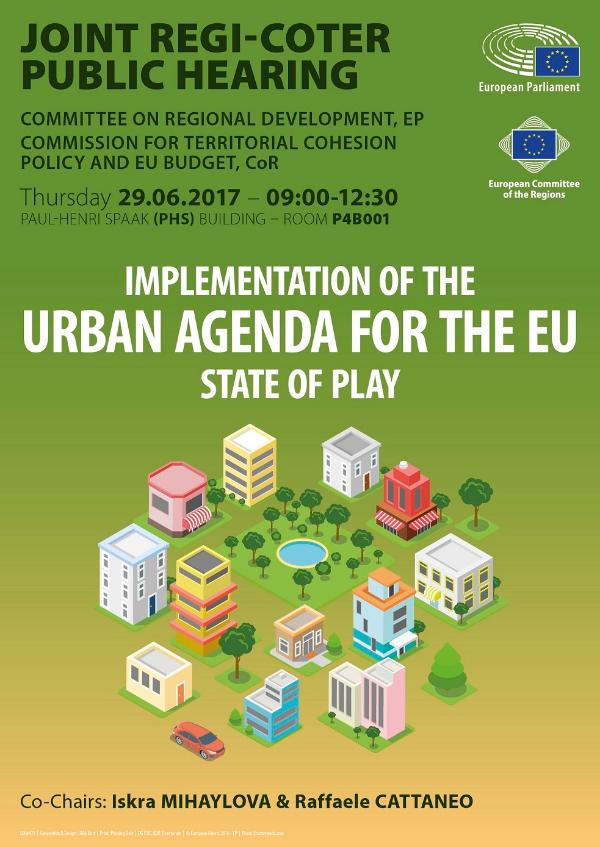Looking back on the joint REGI-COTER public hearing on the Urban Agenda for the EU, Brussels, 29 June 2017
-
0 comments
The Urban Agenda for the EU offers a new governance structure for multi-level and multi-stakeholder cooperation on urban issues in Europe, making it a profoundly political process.
/futurium/en/file/20170629jointregi-coterpublichearingjpg2017.06.29_joint_regi-coter_public_hearing.jpg

It is therefore no surprise that two of the most distinct political proponents of the Urban Agenda, the European Parliament (EP) and the Committee of the Regions (CoR), accompany the implementation process closely. Hereby, the EP Committee on Regional Development (REGI) and the CoR Commission for Territorial Cohesion Policy and EU Budget (COTER) play a key role.
The joint REGI-COTER public hearing on the implementation of the Urban Agenda for the EU is a vivid example of this engagement. The hearing, which took place on 29 June 2017 in Brussels, assembled key institutional actors within the Urban Agenda to assess the state of play of the implementation of actions set out in the Pact of Amsterdam, with a particular focus on the thematic Partnerships.
The chairwoman of the REGI Committee Iskra Mihaylova, chairing the hearing, looked back on the developments after the adoption of the Pact of Amsterdam. She emphasised the REGI Committee’s involvement in the process and pointed to the relevance of aligning the post-2020 cohesion policy reform with the Urban Agenda process. Raffaele Cattaneo, Head of the COTER Commission, added that it was time for a first assessment, knowing that the Pact of Amsterdam marked only the beginning of a process. He mentioned the critical relevance of better coordination between the European institutions and Member States, but also highlighted the need for civil society participation in the Urban Agenda.
The twelve Partnerships form the most prominent Urban Agenda action according to the Pact of Amsterdam and are the “main drivers of implementation” (Raffaele Cattaneo). Consequentially, the coordinators of the eight Partnerships established under the Dutch and Slovakian Council presidencies reported on their experiences in establishing and leading the Partnerships.
The coordinators reviewed their successes and challenges they encountered in the multi-level and multi-stakeholder process thus far. In this vein, Hakon Jentoft, coordinating the Partnership on Circular Economy on behalf of the City of Oslo, emphasised that while Member States and EU institutions were used to expressing their needs on a European stage, this was a much newer and more demanding challenge for cities. At the same time, he expressed his conviction the Partnerships would deliver results based on their broad expertise.
The four pilot Partnerships – on the topics of urban poverty, inclusion of migrants and refugees, air quality, and housing – presented an impressive list of accomplishments. These included creating a common understanding of the Partnership topic, bottlenecks and potential solutions, and the collective definition of actions.
During July and August 2017, all interested persons and stakeholders will be invited to express their opinion on the actions put forward by these first four Partnerships by participating in the Public Feedback. More information will be available here, on the website for the Urban Agenda for the EU, as of 10 July 2017.
Participants raised several issues for discussion, among them inter-Partnership cooperation, the role of small and medium-sized cities and rural-urban linkages, the future of Cohesion Policy within the general EU budget, and the challenge of translating the Partnerships’ outcomes into policy practice and instruments.
It emerged that the Urban Agenda for the EU is impacting on the way actors work together within the EU – both with each other and within their own organisations. The level of engagement and commitment to deliver the Urban Agenda is a clear sign of this political impact. With the first Partnerships delivering tangible results, the future of the Urban Agenda for the EU becomes increasingly topical, most certainly against the backdrop of the future of the EU budget and Cohesion Policy in particular.
In closing, the organising institutions, the EP and the CoR, stressed their determination to continue to back the Urban Agenda process politically – in the spirit of citizens' participation, knowledge dissemination via best and worst practices, and lived multi-level governance.
A recording of the public hearing is available on the European Parliament’s website. The CoR has published a summary of the event here.
The Partnership on Housing presented its Mid-term report. Read more here and there.

